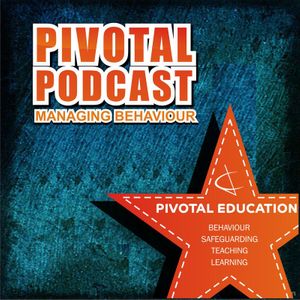Bousted Lets Loose! PP142
Pivotal Podcast - Un pódcast de Pivotal Education

Categorías:
Dr. Mary Bousted, General Secretary of ATL joined us this week to talk about the state of education, initial teacher training, recruitment and retention and a lot more besides! Originally a teacher in Harrow, Mary was a union representative for the National Union of Teachers and eventually became General Secretary of the Association of Teachers and Lecturers in 2003. Mary believes that too often DfE speak to leaders and managers, assuming they will get the voice of the profession. It’s very important to speak to techers’ representatives as well. The views of teachers and leaders are often complementary but they are not always the same and you need to listen to the majority of the workforce. Is there a new direction of travel at the DfE? Mary is impressed by Justine Greening, the new Secretary of State for Education. She likes the way in which she is asking questions like ‘How did we get here?’ and ‘What’s the evidential basis for this idea?’ So we are moving to a much more careful and considered phase in education. One of the problems is that the previous decisions are still being implemented and working their way through the system. This has impacted very severely on teachers and leaders. Is the mixed economy of routes into teaching working? Mary believes that particularly in shortage subjects, the recruitment situation is serious and targets have not been met this year which compounds the situation from previous years. This is in the context of primary school numbers increasing and then following through to form increases in secondary numbers. Mary is also concerned to know what will happen to the thousands of overseas teachers who are already teaching here. So Mary thinks that the teacher supply model is not working – with a highly-confusing picture of different routes which she believes have been implemented far too quickly and without proper planning. Mary says there is nothing wrong with schools taking more responsibility for teacher training but there is a limit to what schools can do. Most schools want a partnership with Higher Education institutions rather than to do all the training themselves. She worries that a lot of trainees are getting a good grounding in classroom management and school policies but not enough input on subject knowledge development or complex issues with a big theoretical base like assessment. I think it’s a full-blown crisis. Mary points out that 1 in 5 maths and English lessons is now taught by a teacher who doesn’t have an A Level in that subject. Schools, she believes, are putting their best-qualified teachers into Key Stage 4 and 5 exam classes which means that teaching lower down the school is often done by those who are teaching out of subject and this is bound to affect student performance. How do we retain excellent teachers? Mary thinks teacher retention is as big if not a bigger problem than teacher recruitment. She mentions figures like 52% of teachers in England having less than 10 years’ experience. The research shows that young teachers are looking at the 50-60 hour week combined with the high pressure in schools where too often they feel their professional expertise isn’t valued and ‘voting with their feet’ – leaving the profession after 3 or 4 years. Mary says that teachers in England are getting on average 4 days of CPD a year while the OECD average is 10 days and in Shanghai it’s 40 days a year. Teachers are over-worked and under-supported. * We have to address the issue of pay * We have to do something about teacher professionalism – they need to be able to focus on the things that matter like teaching learning and assessment Grammar schools – can they be re-designed or will they simply be a mirror image of what we have?